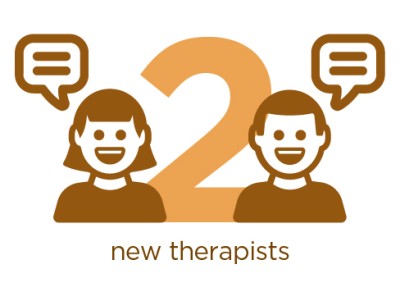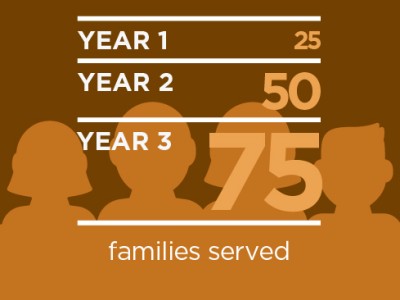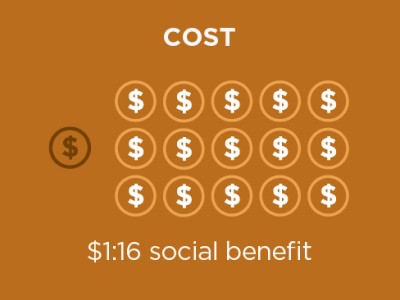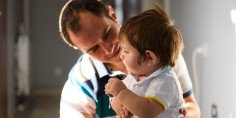Here’s more from the interview:
Q. What did Hopeful Horizons look like when you came onboard 15 years ago?
A. We were called Hope Haven of the Lowcountry and we were a children’s advocacy center and rape crisis center. Our budget was $225,000 — it’s $3.7 million today. We had three staff members then — over 50 now.
We were a dying organization. It was really the strong community here that kept our doors open.
Q. You were a social worker and program director in Louisville, Ky. Why did you agree to lead a sinking ship?
A. I believed in the mission. And sometimes, naïveté can be a plus.
Q. What helped turn things around?
A. Early in my tenure, The Duke Endowment contracted with Innovation Network in Washington, D.C., to help three dozen children’s advocacy centers in the Carolinas go through an evaluation process. We had all met national accreditation standards — but at that point, we weren’t eligible for Endowment funding. To be considered, we had to find a way to demonstrate our impact on children and families served.
Innovation Network helped us develop a logic model, a common set of outcomes, and a set of standardized data collection instruments.
I jumped right on the train because I knew that work would help take us to the next level. It laid the groundwork for recognizing the importance of measuring and tracking outcomes — and while we’ve evolved beyond the measures we identified 15 years ago, the principles still guide us today.
Q. Hope Haven also participated in Project BEST. Describe that work for us.
A. With funding from the Endowment, Project BEST began in 2007 as a way to help every community in South Carolina offer high quality support for abused children. (“BEST” stands for “Bringing Evidence Supported Treatments” to children and families.)
Effective treatments have been tested and are ready for use in the field — but making those treatments widely available is a struggle. Abused children suffer needlessly because they and their families aren’t receiving proven, evidence-based trauma treatment.
Q. What was the goal of Project BEST?
A. To help clinicians receive training in a mental health intervention called Trauma-Focused Cognitive Behavioral Therapy. Through extensive testing, TF-CBT has been shown to outperform usual care in reducing the negative consequences of abuse and trauma.
We were one of the pilot sites, and that was a turning point for us regarding the multiple benefits of offering evidence-based programs.
Last year at Hopeful Horizons, by the way, 100 percent of children/adolescents who completed TF-CBT reported their main complaints had improved; 100 percent of parents said the therapy helped them better assist their child after trauma. Also, average child trauma scores dropped by 11 points. A score of 15+ indicates a likelihood of significant PTSD symptoms. Our average pre-treatment score was 21; the average post-treatment scores dropped to 10. (A 7- to 8‑point drop is considered clinically significant.)
Q. Let’s talk about Parent-Child Interaction Therapy, which is another one of the evidence-based programs you offer. How does it work?
A. It’s designed for children ages 2 – 7 with disruptive emotional or behavioral problems. The parent and child are in one room; a therapist observes them through a one-way mirror and provides coaching that parents hear through an earbud.
The real-time coaching provides many light-bulb moments. Parents see right before their eyes the change that can happen when praise, for example, is given in a certain way. PCIT is very structured, so they can practice these new skills until they master them.
Q. How will you use the new grant?
A. We’ve consistently had about 15 families on a waitlist for PCIT, and the wait is typically six months. We sometimes refer them to services in Charleston, but that’s an hour and a half away.
With expansion, we’ll be able to help at least 25 families during the first year, 50 in the second year and 75 in the third year.
Q. This is challenging work. What keeps you optimistic?
A. We’re seeing so many positive changes with families who have graduated from these evidence-based programs. PCIT, for example, is life-changing for both the parents and the child. I believe we’ll see a generational impact.
Q. In 2017, Hope Haven merged with Citizens Opposed to Domestic Abuse (CODA) to become Hopeful Horizons. How did that come about?
A. It came after two years of assessment, and the impetus was that we were seeing lots of crossover cases in child abuse, domestic violence and sexual assault.
Both organizations were thriving, and the timing was right. Merging allowed us to offer more comprehensive, wrap-around services.
Kristin, my replacement as CEO of Hopeful Horizons, had been the executive director of CODA for more than nine years.
Q. Looking back, what advice do you have for other nonprofit leaders?
A. Make sure you have a good board. Finding the right people to fill those seats is key.
Q. What were your priorities before leaving?
A. My last two tasks as CEO were providing the leadership of letting go and the leadership of paving the way.
Q. What do you hope your legacy will be?
A. That families, children and victims are finding the help they need to have a second chance at life.








